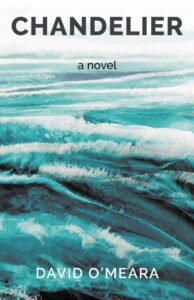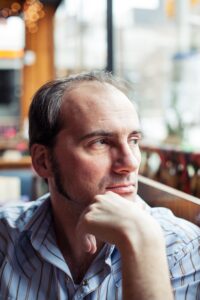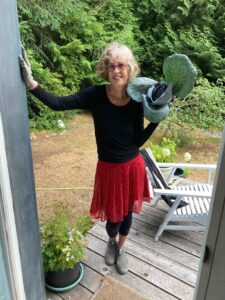Trajectories of a disconnected family
Chandelier
by David O’Meara
Madeira Park: Harbour Publishing, 2024
$22.95 / 9780889714762
Reviewed by Caitlin Hicks
*

The first novel by poet and playwright David O’Meara tells a three-part story of a family split up by circumstance, choice, and the inevitable confusion about the meaning of existence. The language in Chandelier is precise, compact, and flowing; the conversations, easy to follow. Each scene in the narrative is composed of naturally evolving images created by hard-working words and sometimes elegant phrases, whose meanings arrive in our consciousness like unexpected gifts.
There must be thousands of these gems throughout this work: “I wake to a sharp sting, discomfort in my left rib and a rock stadium clamour of birdsong. European starlings. Black-capped chickadees. Opening my eyes, I see filthy shoes discarded on the floor near the woodstove. I tug them on. The air smells like wet dog, light fuzzily glowing around the curtain.”
The title, Chandelier, refers to the seconds inside a cresting wave where the surfer rides until she can safely escape. In this story, each character could be considered to be in their ‘chandelier,’ balancing the moving conditions and calculating the seconds to freedom to the next swell, to new consciousness? The writer is a poet, after all; his words create a world, yet merely suggest its meaning. For the reader, it’s the enjoyment of a thousand experiences and observations unexpectedly articulated, and that’s the thing about this novel. Every sentence.

O’Meara introduces the reader first to Georgia, daughter of Sarah and Hugo. Three years after the accidental death of her best friend, Natalie, she’s lost in a new job as an ESL teacher in Korea. Georgia’s meandering existence is conveyed with scenes of dark bars, stolen beer, L-shaped pool parties, and street demonstrations. There’s a lot of drinking; and it’s difficult to follow the trajectory of her desires, or understand the fog she appears to inhabit. Her story is told in the third person, as if from a distance.
Even when we meet Georgia’s divorced parents, little is clear; it’s a glimpse of their lives—random and detailed and without a reliable guide. Eventually O’Meara moves in on Georgia’s father, through a monologue told in the first person. Hugo comes to life vividly as a similarly lost individual, though he’s trying to revitalize himself through revenge. On a trip to a conference in Barcelona that he hasn’t been invited to, Hugo reflects on his marriage to Sarah, and outlines the incident that ruined his reputation as an architect—a wall that crashed unexpectedly in a building he designed. He’s compelling and dynamic if a bit over-the-top, but as observant as the poet-author who created him. His excesses focus the narrative and perhaps the trajectory of the disconnected family.
Sarah is more difficult to pin down. Her descriptions paint the crumbling emotional reality of the disconnected family Sarah, Hugo, and Georgia became. The novel unfolds in chapters reflecting current time with backstory a naturally occurring thought jump to back up the current status of the life of this scattered family.
At first, Sarah goes ‘missing’–not showing up in the usual places—but O’Meara depicts her toppling into a ditch during bad weather. We follow her as she reinhabits a cabin from her childhood and wrestles with being duped out of a lot of money. During a fragile night of solitude, she revisits her family relationships. That is, until a friend from her youth knocks at a cabin door that has been barricaded upon a sighting of a huge black bear.
In Sarah’s monologue, we hear a summary of her ex that sounds like the rest of the narrative: concise, hard working, and although relayed through Sarah’s own perspective, seemingly told from a distance. In a description of her then-husband, Sarah sounds like the narrator rather than the personal observer: “Tainted and defiant, Hugo was reinvented as the bad boy of urban renewal and architectural design.” The writing is so easily descriptive that you get sucked into the small details until you arrive at the end of the chapter, still not understanding what is the important characteristic you should be paying attention to in your desire to connect with the story, with the characters, with the family. Also, and perhaps this is the unsatisfying emotional link in the failed family, Sarah has moved on, confident in her analysis of why the relationship and/or family no longer worked for her.
Finally, in summarizing her daughter to Daniel, Sarah admits to therapy and counsellors but also, “I don’t tell him everything.”
And that’s the feeling you’re left with at the end of the novel, that you have missed the essential detail as it sailed by in a perfect sentence of lovely, concise description. What is the writer not telling us? How did these three people miss each other so thoroughly? After being pummelled and practically drowned by storm waves during a risky surfing expedition, Georgia asks herself, “What do I have left?” Her question parallels her random search for the perfect wave—and her feelings of existential loss in the recent aftermath of her family tragedy.
The dissatisfaction engendered by emotional conclusions just under the veneer of brilliant description is an accomplishment here; the reader is left with the same feelings that each character could have felt in their family world of disengagement, frustration, love-not-quite given, or valued. And when all is said and done, how much of a life is left in which to find and embrace the hard-earned meaning? To find the resonant relationships? To discover a measure of satisfaction? O’Meara’s first novel tugs in the way art should, to put its arms around the human experience so that we take notice of our perspective and come away enriched.

*

Caitlin Hicks is a BC-based writer and performer. In addition to journalism and reviews, she’s written for stage, film, and radio; her novels include Kennedy Girl and A Theory of Expanded Love. Read more at www.caitlinhicks.com. [Editor’s note: Caitlin recently reviewed Leslie Howard in BCR.]
*
The British Columbia Review
Interim Editors, 2023-25: Trevor Marc Hughes (nonfiction), Brett Josef Grubisic (fiction and poetry)
Publisher: Richard Mackie
Formerly The Ormsby Review, The British Columbia Review is an online book review and journal service for BC writers and readers. The Advisory Board now consists of Jean Barman, Wade Davis, Robin Fisher, Barry Gough, Hugh Johnston, Kathy Mezei, Patricia Roy, and Graeme Wynn. Provincial Government Patron (since September 2018): Creative BC. Honorary Patron: Yosef Wosk. Scholarly Patron: SFU Graduate Liberal Studies. The British Columbia Review was founded in 2016 by Richard Mackie and Alan Twigg.
“Only connect.” – E.M. Forster